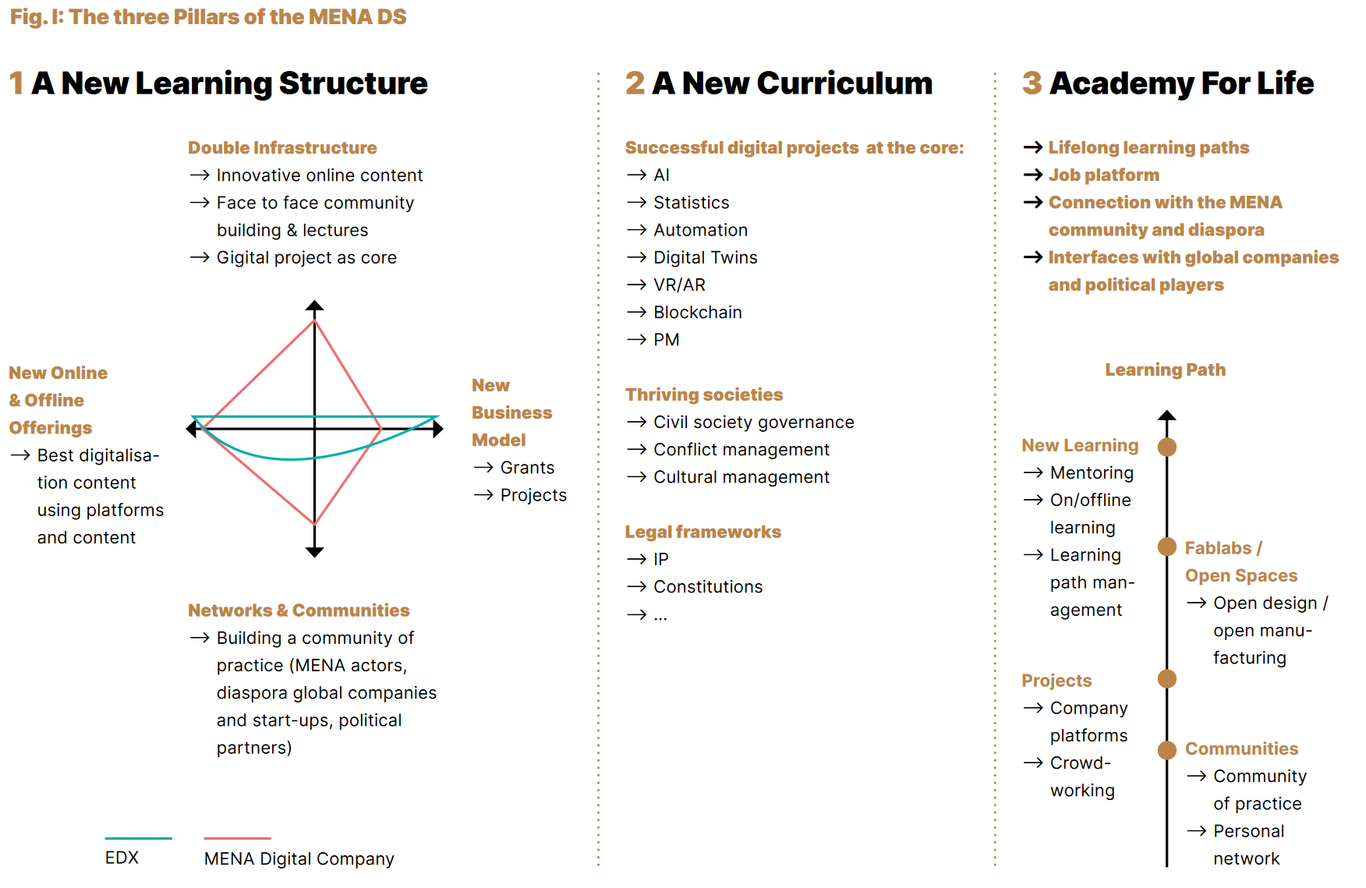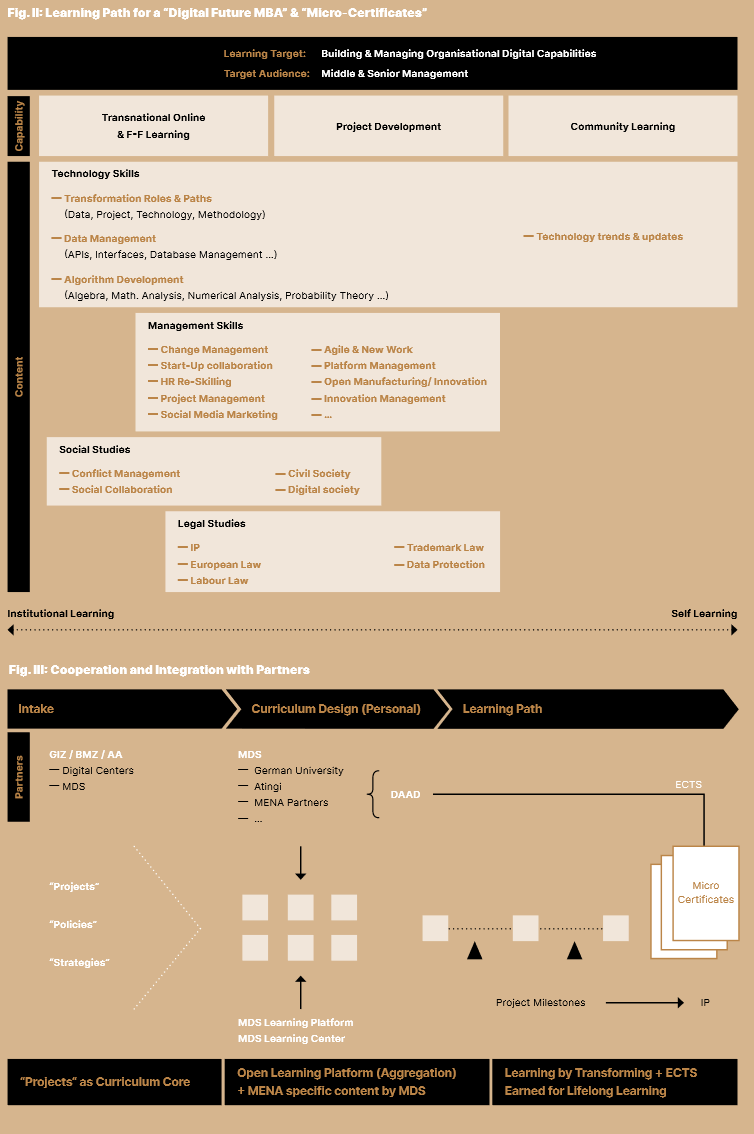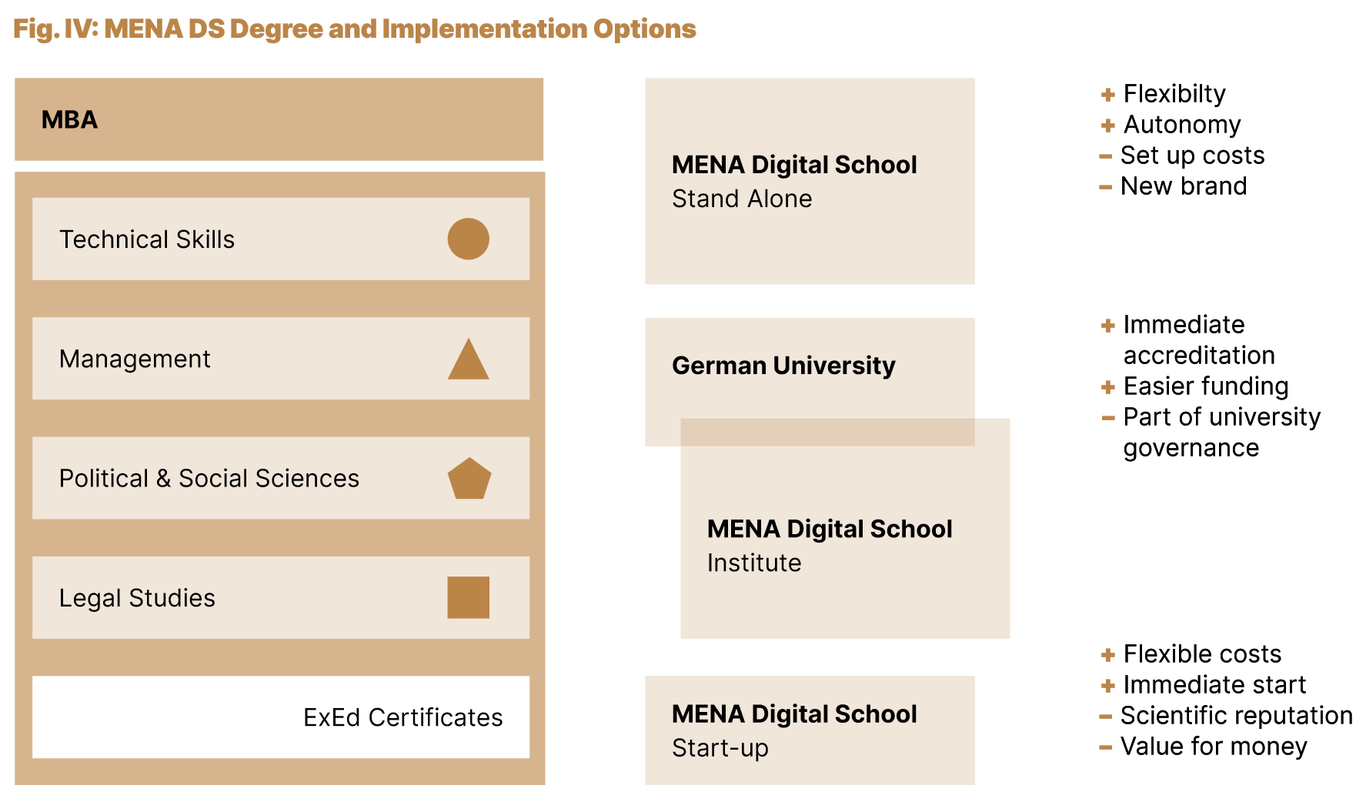Vision Digital learning Path and MENA DS Curriculum
"A higher education degree or equivalent levels of professional experience are still the best guarantee to secure a job in the future labour market"
World Economic Forum Future of Jobs Report, 2017

The overarching aim of the Candid Foundation’s MENA Digital School project is to address and manage the disruption caused by the processes of digitisation on the economy and society of the MENA region. The McKinsey Digital Middle East report of 2016 concluded that one of the most important solutions to the growing significance of digitisation was addressing the talent gap. As part of its recommendations, it detailed the far-reaching impact that the development of local talent could have on the workforce: in developing and integrating digital curricula to mainstream education, the region would be able to generate and retain its own digital talent. As such, the focus of the MENA DS project’s research has been on discovering the optimum way to reach, attract and retain this talent. Therefore, we have designed a model of the MENA DS built on three pillars and refined it in accordance with our research results.
Structure
A new learning structure with a hybrid infrastructure of online and offline offerings which would distinguish the institution from conventional e-learning tools, embedding students in a community of practice ranging from the alumni and the diaspora to startups and global partners from the private and public sector. The MENA Digital School envisioned could take the form of offering both micro certificates for executive education as well as a fully accredited Masters of Business Administration (MBA) and aggregate already existing content.

Curriculum
A new project-based curriculum which not only entails technical skills but also holistically conceptualises digital transformation as a process affecting business, governance, civil society and the media. In addition to data management and algorithm development, management skills such as agile and new work, startup collaboration, platform management, HR re-skilling and social media marketing could also be taught. Furthermore, digital social and political sciences, conflict management, legal frameworks, data protection, and labour law should also be included on the curriculum, which could be delivered through tailor-made learning paths.
Academy
The academy for life concept envisages education in transformation as a lifelong project designed around community-based mentoring and new learning styles. In addition, the MENA Digital School would not be a stand-alone institution. Following this community-based approach, we envision it as deeply intertwined with the offerings already developed by potential project partners, including German diplomacy and German corporations, as outlined in Fig.III.

The demand for such an institution was identified as pressing. Consequently, building the school should follow a piloting approach that allows for the selection of partners in MENA and Germany according to the demands of students, the implementation process, and is easy to scale up. It could therefore include different institutional stages and shapes along a development path.
Our research, grounded in both policy-guided research and interviews with sector experts, points to three possibilities for implementation:
(A.) A fully accredited higher education institution
(B.) An institute within an already existing higher education institution
(C.) A digital education startup
These three options can be split into two clear groups. Options A and B entail traditional university programmes of study, with official university degrees awarded at the end. Option C offers service users a more flexible and short-term course of study, with an open badge certificate awarded upon completion of a course.

Options (A) And (B):
Traditional Higher Education Programme
Degrees
In terms of course content and structure, options A and B offer clear benefits in the comprehensive educational nature of their offerings. Postgraduate programmes can pave the way for academic and/or professional careers by building on students’ knowledge of various technological fields, with the option to specialise further down the line. In targeting young people – a group eager to gain knowledge and hands-on experience with up-and-coming technologies – it offers a direct route into fields in which Arab youth are currently under-represented. And since the threat of displacement by automation technology is most stark for current workers with low to medium levels of education and experience, an early/pre-career option for education and – crucially – accreditation could contribute considerably to preempting the negative impact of automation.
The result – highly knowledgeable graduates with an accredited degree – is held in high esteem both regionally and internationally, recognised by employers and further education institutions alike. Furthermore, traditional degree programmes offer a clear means of evaluating the success of the programme, since alumni offices can collect data on the proportion of graduates in relevant employment six months after graduation.
Executive Education
Beyond simply offering postgraduate programmes, our research has suggested that offering selected modules as Executive Education programmes could make us stand out as a leading provider of technological training. Discussions surrounding education often tend to focus on young people graduating from high school and receiving undergraduate/postgraduate university degrees. This ignores the importance of continuous professional development to career growth and the expansion of skill sets in line with changing trends. To limit our understanding of education to the end of an undergraduate or postgraduate degree would be to underestimate the vital significance of lifelong learning.
In offering Executive Education courses in addition to postgraduate study programmes, the MENA Digital School could address a gap in the market: specific mid- to late-level career training in digital transformation. Since digitisation will affect the entire labour market, both those about to start their careers and those who are decades in, this additional service would allow for a more comprehensive approach.
A number of executive education programmes focused on Middle Eastern professionals already exist, but few offer a focus on technological training. By adapting a select number of master’s degree courses to fit an Executive Education course – the duration of which would range from a few days to multiple weeks – our programme would accommodate professionals looking to learn more about the rapidly advancing technological world.
Demographics
The MENA Digital School’s proposals for its higher education programme target a small but crucial number of future key decision-makers at the right juncture in their professional lives. In offering a group of talented individuals an advanced and comprehensive educational opportunity, it prepares them for a promising career in positions where they can expect to effect change.
The Executive Education programme, however, would build on existing power structures by advancing the skills of those already wielding influence. These courses are aimed at key decision-makers who recognise that the situation in the region must change and adapt to developing circumstances, but who do not know how to do this. Our programme would equip them with the tools necessary to implement the changes that are so in demand.
A consideration of this programme, demographically speaking, is that higher education programmes tend to exclude a large proportion of the Arab population for whom higher education has been out of sight for so long – people who have not been in a position to undertake an undergraduate degree, let alone consider postgraduate study. Furthermore, teaching that is in-person and abroad would present limitations to who can attend – specifically for women (whose families may not feel comfortable with their going abroad unmarried) and individuals from low-income families (who may not be able to pay the fees).
Institution
There are many factors to be considered if the MENA Digital School is to exist as an independent institution. Although this would afford it a great deal of freedom to abide by its own educational and logistical inclinations, it presents a challenge in the early years. Formally speaking, the process of accreditation can be complicated and difficult. Beyond this, it can take a great deal of time and careful planning for an entirely fresh organisation to establish itself as worthy of esteem and respect on the international stage. But, as the Hertie School and the Barenboim-Said Akademie have shown, it is not impossible.
An alternative option would be to establish a MENA Digital School institute as part of an already existing, well-respected and renowned educational institution. This would allow the MENA Digital School to focus less on organisation and logistics, such as branding, accreditation and the like, and more on content and implementation. In such a configuration, students would enjoy the benefits of the institution’s existing networks and connections. This would also mean that a graduate of the MENA Digital School would be awarded a degree held in high esteem by employers and academics. Our research showed that American and British universities are more prestigious in the Middle East, but ‘Made in Germany’ is nonetheless seen as a guarantor of excellence.
Option C:
Startup-Based Digital Learning Platform
Course Content
As outlined earlier in the Key Findings section, initiatives aimed at supporting students alongside their studies, or serving as a career add-on, have been launched with increasing frequency. These specialised training courses are usually offered on a digital learning platform, with participants awarded open badge certification.
A MENA Digital School functioning as an online digital educational service would have the flexibility required to keep up with the constantly changing trends and demands of the technological world. Standards in the field of digitisation are changing too quickly for traditional certification processes to keep up with – a startup platform would ease curriculum development and be adaptable to changes on the ground.
Certification
Certification does not necessarily have to be in the form of an officially recognised university degree. Various existing programmes have developed their own unique forms of certification, underpinned by their external supporting bodies. Examples include Udacity, an American educational organisation focusing on tech skills, and GIZ, with the Atingi platform. In the case of Udacity, its internationally recognised name adds legitimacy to the course’s ‘nanodegree’ certification upon completion of the course modules.
Demographics
A resounding benefit of the digital learning platform option is the flexibility it offers in terms of target group. It could accompany the primary education of a young child with skills advanced beyond their age, or of an early career professional looking to expand their skill set. Individuals from low-income backgrounds could more readily take part in such a programme, fitting it in alongside the gainful employment necessary to support their family.
Institution
This would require establishment of the MENA Digital School’s brand, to make the programme an attractive option for potential service users. To make up for the lack of a competitive certification – namely, a university degree – the startup would need to inspire confidence in course participants that the certificate awarded at the end would be held in high esteem by future employers. Reputation is key to establishing the MENA Digital School as an effective global player in the digital education arena.
